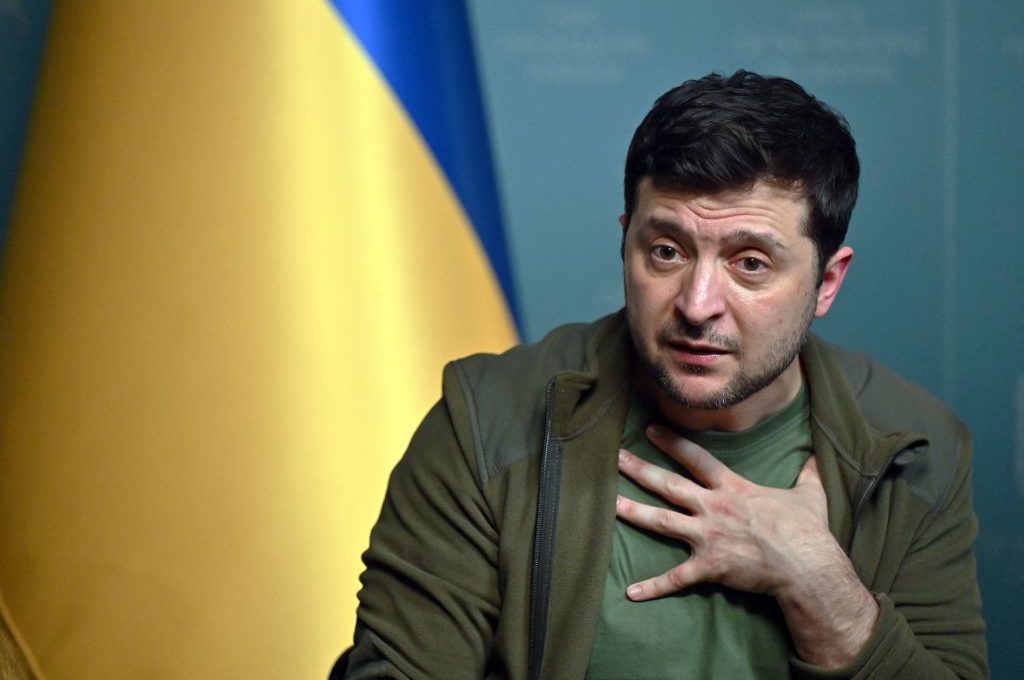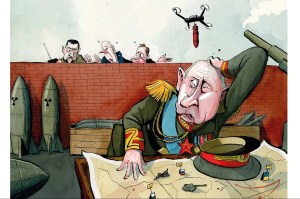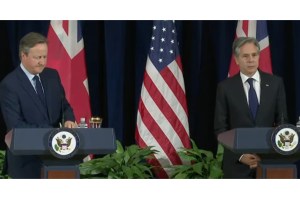As Ukrainian President Volodymyr Zelensky addressed the UN Security Council today with all the anguish you would expect from a wartime commander-in-chief, he could nonetheless be relatively pleased about several things.
Sure, Zelensky and his advisers are constantly making the point that Ukraine needs bigger and better weapons to resist Russia’s invasion, but the West has been quite responsive to Kyiv’s requests. The Biden administration’s latest weapons shipment, announced last week, adds to the $1.6 billion in military aid the US has sent to the Ukrainian military since the war broke out on February 24. The Czech Republic has reportedly delivered more than a dozen Soviet-designed T-71M tanks to the Ukrainians, and the West is essentially committed to a policy of arming the Ukrainians for as long as the conflict continues.
Zelensky can also be relatively pleased with the West’s economic response to Vladimir Putin’s war of choice. Again, the Ukrainian government would obviously like Europe to slap an immediate import ban on all Russian energy sources to drain Moscow’s ability to maintain its military campaign. But the fact that the European Union is even discussing a ban on Russian oil and natural gas — this week, the EU will debate and very likely approve a package prohibiting the import of Russian coal — is a sea-change from the bloc’s traditional skittishness on this issue. One hundred and forty-nine Russian diplomats have also been kicked out of various European countries over the last two days, adding to the 100 previously thrown out since February 24.
However, Zelensky will be setting himself up for disappointment if he expects the West to become Ukraine’s ultimate protectors.
Given the atrocities committed by Russian troops in cities and towns like Mariupol, Kharkiv and Bucha, you certainly can’t blame Zelensky and his administration for wanting concrete security guarantees as his negotiators continue to talk with their Russian counterparts about a possible settlement to end the war. What the Ukrainians envision is essentially a defense commitment similar to NATO’s Article Five, in which an attack on Ukrainian soil would prompt security guarantors like the US, UK, Germany, France, and Italy to deploy their own forces to preserve and protect Ukraine’s sovereignty and territorial integrity. From Kyiv’s standpoint, there is logic to the proposal: if you expect us to give up on NATO membership and embrace neutrality, then you ought to provide us with some assurances.
Unfortunately, Zelensky’s idea in its present form is unworkable for a number of reasons.
First and most obvious, Russia isn’t going to go along with it. In an ideal world, we wouldn’t need to concern ourselves with what Putin thinks. Some would argue that Russia’s views on the matter are irrelevant, since Moscow shouldn’t have a veto over Ukrainian security policy anyway.
Yet back in the real world, Russia does in fact have a veto. Any peace deal that ends the war in Ukraine will have to clear the corridors of the Kremlin if it has any chance of success. It’s exceedingly difficult to imagine Putin, a man who has railed about NATO encroachment into the post-Soviet space for over two decades, tolerating a scheme whereby NATO’s biggest military powers effectively serve as Ukraine’s insurance policy. It’s more likely Russia will greet the Ukrainian proposal as too cute by half, an indirect way for Kyiv to de-facto join NATO without having to officially become a member.
The other problem: none of the countries Ukraine is asking to be security guarantors are willing to enlist for the job. UK Deputy Prime Minister Dominic Raab has ruled out a NATO-type arrangement, telling BBC Radio that “we’re not going to, I think, replicate unilaterally the NATO commitments that apply to NATO members.” The Biden administration has avoided addressing the merits of Kyiv’s proposal and prefers to talk in generalities — hardly a good omen for Zelensky.
The Ukrainian government will predictably greet this reticence with disappointment, if not outright anger. How can the West be so cynical, Ukrainian officials may ask themselves?
What Ukraine needs to understand, though, is that the West’s lack of enthusiasm for serving as Kyiv’s guardian angel has nothing to do with cynicism, selfishness or weakness and everything to do with realism and war avoidance. NATO may support its members sending the Ukrainian military an assortment of military goodies to fend off the Russians, but the alliance isn’t willing to plunge into a direct conflict with Russia on behalf of a non-member. What Kyiv sees as a commonsense proposal to provide itself with more deterrence, NATO sees as a stepping stone toward an escalation with Moscow it wants no part of.
This should hardly come as a surprise to Zelensky and his administration; there is a reason why NATO as an institution was never particularly delighted with the idea of bringing Ukraine into the alliance (notwithstanding former President George W. Bush’s attempts to do so fourteen years earlier).
So while we can’t fault Ukraine for asking for an internationally guaranteed defense shield, neither can we fault the US and its NATO allies for turning it down.


















